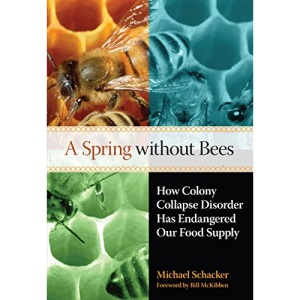
by Michael Schacker (Author)
Using CCD as a metaphor for our own human hive, Schacker asks: Are the bees trying to tell us something? Could this be the warning sign of a much larger crisis looming directly ahead? Might humankind suffer someday from 'Civilization Collapse Disorder'? And how must we change our human hive in order to ensure its survival? Like "An Inconvenient Truth" and "Silent Spring" before it, "A Spring without Bees" is a compelling cautionary tale and a clarion call for action. On the 100th anniversary of the birth of Rachel Carson, the world faces a new environmental disaster, from a chemical similar to DDT.This time the culprit appears to be IMD, or imidacloprid, a relatively new but widely used insecticide in the United States. Many beekeepers and some researchers think IMD is the new prime suspect for the devastating syndrome known as Colony Collapse Disorder, or CCD, which has raised the annual die-off rate of honey bees to 30 percent of all the beehives in the United States. They say even trace amounts of IMD make bees lose their desire to feed, which would quickly lead to the collapse of their colony. After several days, there are few or no bees left in the hive. Since honey bees are essential to the production of fruit, nut, and vegetable crops around the world, their demise could spell catastrophe for our food supply and global economy.
Format: Hardcover
Pages: 304
Edition: illustrated edition
Publisher: The Lyons Press
Published: 31 Jan 2009
ISBN 10: 1599214326
ISBN 13: 9781599214320